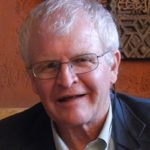CD Doug Teschner’s (Ukraine & Guinea) Words of Wisdom — Leadership during a Pandemic
Thanks for the ‘heads up’ from Dan Campbell (El Salvador 1974-77)
Leadership during a Pandemic
Will you be ready when a crisis strikes?
June 3, 2020
Doug Teschner (Ukraine & Guinea 2008-16)
NHBusiness Review
Watching the Covid-19 pandemic unfold has a déjà vu feeling for me. From 2008 to 2016, I was a Peace Corps country director and, in July 2014, transferred from Ukraine to Guinea in West Africa. Soon after I arrived, there was a spike of Ebola cases, and we evacuated the Peace Corps volunteers back to the United States. I stayed behind with the American and Guinean staff, and we collaborated with the Centers for Disease Control and Prevention on an innovative community education effort that helped end the Ebola epidemic in 2016.
Of course, I had moments of concern for my own health, fueled by “media optics” and pleas from some back in the U.S. that I leave immediately. But I learned how to protect myself and to focus objectively on the situation. Press stories, while mostly accurate, fueled people’s worst fears, and the uncertainty led people to imagine the worst.
Panic can bring out the worst in people. My wife and I had moments of feeling like pariahs when we left Guinea to visit the U.S. Sadly, we are seeing some of these same kinds of irrational behaviors today, although many are also rising to the occasion by looking out for others.
As I reflect back on my West African experience, one of the things that really made a positive difference was the leadership by U.S. Ambassador Alex Laskaris, who demonstrated an array of key leadership skills:
- Stay positive. Negativity, panic and fear only undermine the team and result in irrational actions.
- Focus on facts and science. Understand the reality of the situation, including the disease and how it is transmitted.
- Listen to the experts. The leader cannot know it all and needs to rely on other talented people. We were lucky in Guinea to have expertise from the CDC, the U.S. Agency of International Development and other agencies.
- Understand the culture. Engaging the Guineans to understand the cultural context was critically important, as is true in any crisis situation.
- Be inclusive and collaborative. Engage others to facilitate an effective response.
- Transparency. Openness reduces rumors and confusion.
- Communicate. Share what you know and do it regularly,
- Support your team. Everyone needs encouragement during such a stressful experience.
Of course, Ebola is a very different disease than Covid-19. While it is more likely to be fatal, a person can only get Ebola by direct contact from an actively ill individual. Coronavirus, while less serious for most people, is reportedly much easier to catch — even from someone with mild or even asymptomatic conditions.
No two situations are ever the same, of course, but the same leadership principles I witnessed in West Africa can be applied to the current situation. Uncertainty creates stress as people are suddenly yanked out of their comfort zones. They need reassurance that leaders can move things in a positive direction.
Building trust is critical, as is transparent communication of accurate information. If people lack confidence in the leader, the response will invariably be less effective. Leaders who project a positive approach will be more effective in rallying people to a clear cause.
One big challenge is needing to make decisions without having as much information as you might like. This is where having a strong team can really make a difference, helping you to gather solid information and develop and implement the best plan of action. Assemble the best talent, delegate tasks, listen to their advice and reward positive behavior. In the midst of a crisis, it is easy to forget to acknowledge people’s efforts, so be sure to say “Thank you!” as often as possible.
These skills apply to any crisis situation, of course, not just epidemics, and thus are critically important for leaders. But they aren’t necessarily easy to acquire and apply in a planned, integrated fashion that is ultimately the most effective given the situation. It is vital for each of us to continuously learn, expand our skills and embrace positive change. We never know when an unexpected challenge will occur, so this kind of training and learning should never be put on the back burner. When a crisis strikes, will you be ready?
We each have an extraordinary opportunity to make a difference in people’s lives (including our own). Don’t underestimate your impact!
•
Douglass P. Teschner, founder of Growing Leadership LLC, can be reached at dteschner@GrowingLeadershipLLC.com.

No comments yet.
Add your comment